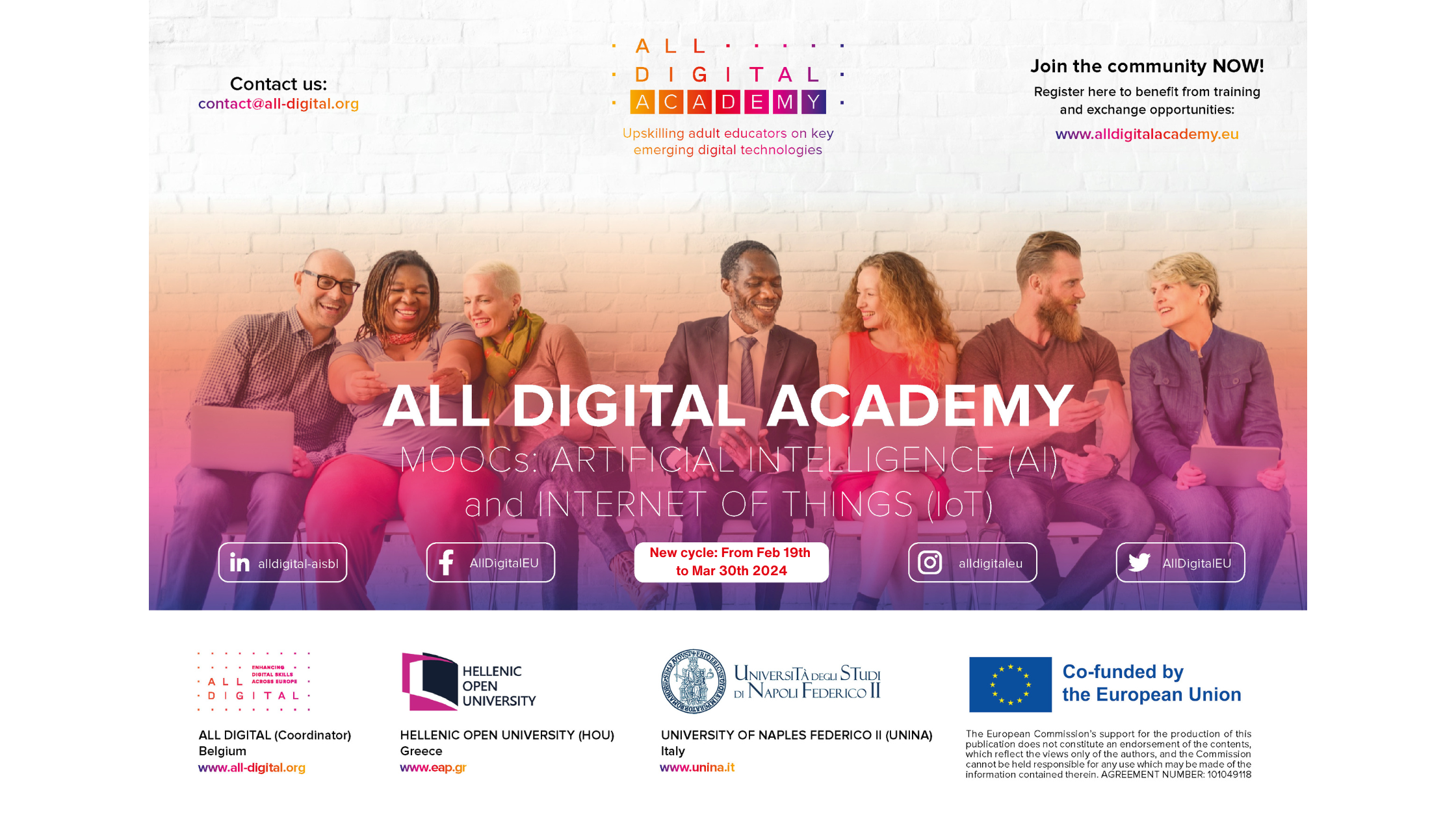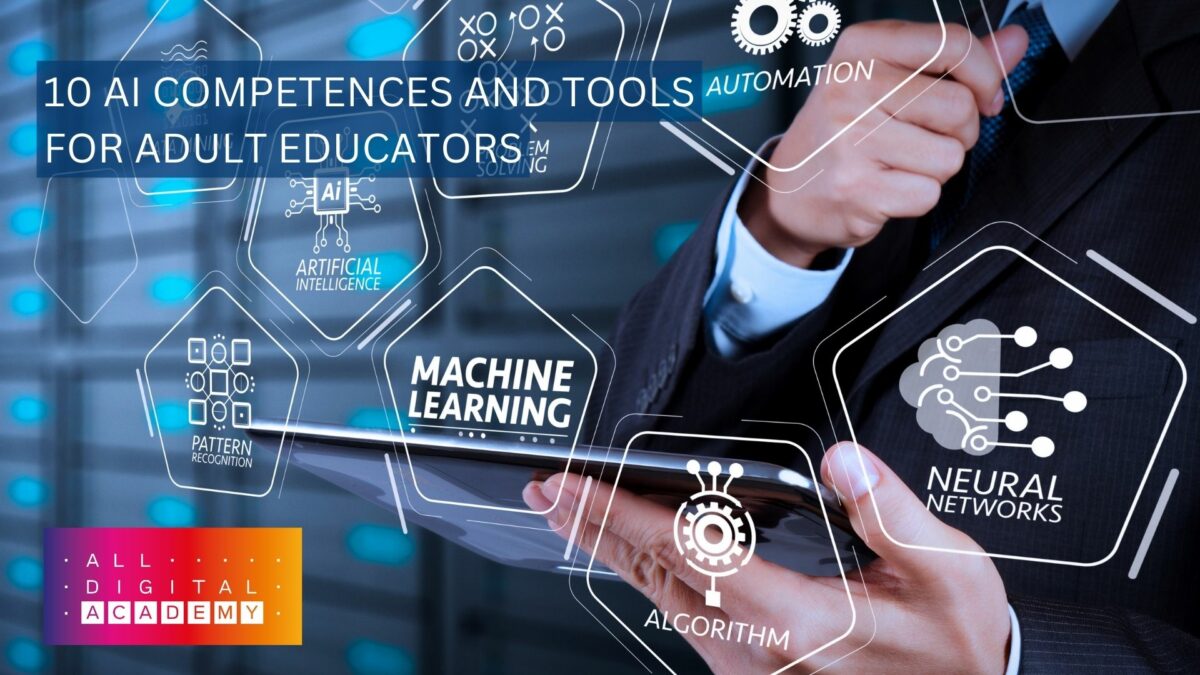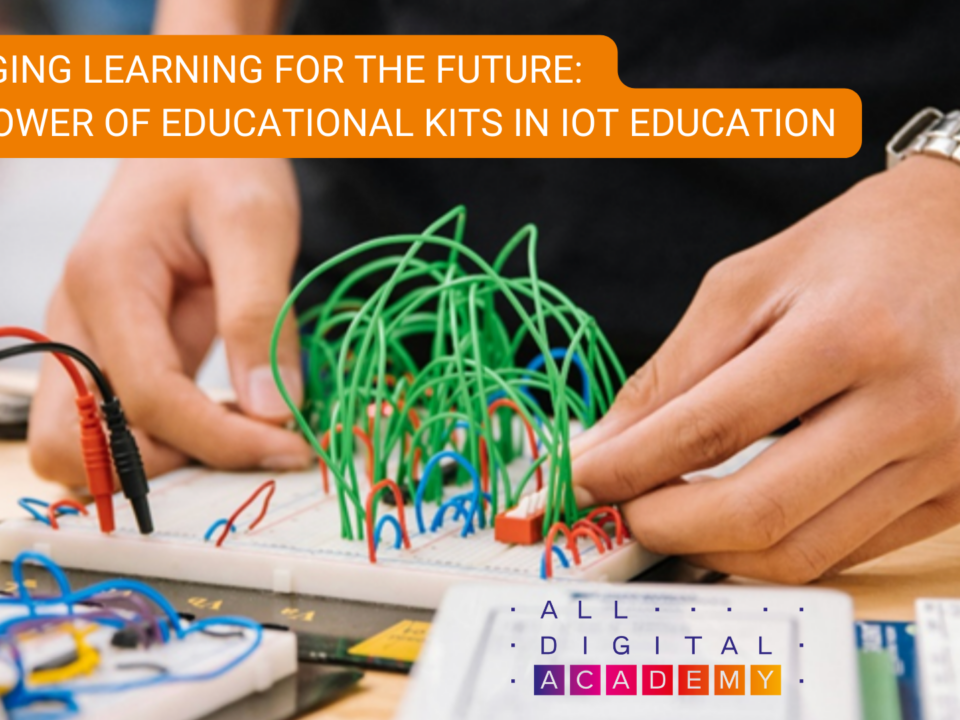
3nd Piloting Cycle Open: ALL DIGITAL ACADEMY MOOCs for Adult Trainers on AI and IoT!
January 15, 2024
The role of IoT in education and related competences of adult educators
January 15, 2024Artificial Intelligence
Artificial Intelligence, within the realm of computer science, is a discipline that focuses on the development and examination of computer systems— also referred to as AIs—that possess the capability to execute tasks typically associated with human intelligence. These tasks encompass learning, reasoning, problem-solving, perception, language comprehension, and even interaction. The primary objective of AI systems is to replicate or simulate human-like intelligence, leading to the automation of processes, improved decision-making, and the handling of intricate tasks. This technology is now integrated into various facets of daily life, and the ongoing rapid progress, known as the AI spring, has given rise to the creation of diverse generative AIs like ChatGPT for language and DALL-E for images, all made possible by advancements in Deep Learning technology.
It’s important to note that AI extends beyond generative models; it is already prevalent in web search engines, recommendation systems, vocal assistants, and numerous other domains. In essence, AI represents a vast array of algorithms and technologies working cohesively to emulate human intelligence. The origins of machine intelligence can be traced back to Alan Turing and his “Bombe,” employed for decrypting messages from the German Enigma-Machine. In another significant milestone during the 1980s, Deep Blue, a chess engine, became the first machine to defeat a human in the game of chess.
With great power…
Artificial Intelligence stands as a powerful tool with the potential to assist humans in performing various tasks, leveraging its inherent capabilities. AI may be able to advance science and find solutions for serious problems. Among its notable strengths are:
· Automation: AI contributes to the automation of jobs by handling tedious repetitive tasks.
· Decision-making: AI systems can process and analyse vast amounts of data at incredible speeds, extracting valuable insights and patterns and can provide decision support by offering recommendations.
· Human error reduction: AIs have the potential to enhance human efficiency and reduce the likelihood of errors.
…Come great responsibilities
AI, like any powerful technology, has potential benefits and potential risks. As the use of these systems is becoming widespread, several consequences and risks have been identified:
- Ethical Concerns: AI applications raise ethical concerns related to privacy, bias, and decision-making.
- Job Displacement: Automation driven by AI has the potential to replace certain jobs, raising concerns about unemployment and the need for retraining the workforce.
- Security Risks: AI systems can be vulnerable to adversarial attacks, where malicious actors manipulate input data to deceive the AI, potentially leading to incorrect decisions.
Future developments in AI
While addressing the ethical and security challenges mentioned earlier remains a crucial focus, research laboratories in artificial intelligence are actively exploring avenues for advancing the technology, especially those based on Deep Learning algorithms. These efforts include enhancing collaboration between humans and artificial intelligence, delving into multimodal learning (where AI comprehends information from various modalities concurrently, including images, text, and audio), and venturing into emerging areas such as quantum computing, a technology that could increase the speed of some processes and thus impacting the training and optimization processes in deep learning. The field of AI is dynamic, and advancements will likely emerge across a range of applications and domains.
Why learning about AI is important for adult educators
Knowledge about AI equips adult educators with the skills to harness technology for more effective teaching, respond to the changing landscape of education and work, and prepare adult learners for the demands of the modern world. As AI technologies continue to advance, there is an increasing integration of AI tools and applications in educational settings. Adult educators may benefit from understanding how AI can enhance teaching and learning processes. Moreover, keeping abreast of AI developments ensures that adult educators engage in continuous professional development. This helps them stay relevant, effective, and adaptable in a rapidly evolving educational landscape. Finally, AI tools can facilitate collaboration between educators and learners. Understanding how to leverage collaborative AI platforms allows adult educators to create interactive and engaging learning communities.
10 AI Competences and Tools for Adult Educators
As seen earlier, the tool of artificial intelligence can open new possibilities for adult educators. It is not difficult to envision how these professionals can integrate AI into the conduct of their lessons. Below, we will list 10 competences/tools provided by artificial intelligence:
1. Automating basic activities: AIs offer valuable assistance to teachers in the grading of tests, streamlining and enhancing the assessment process. Through automated grading systems, AI can efficiently evaluate multiple-choice questions, reducing the time and effort traditionally required for manual grading. By leveraging AI for grading, teachers can save time, ensure consistency in assessments, and allocate their expertise to areas that demand human intuition and understanding. This collaborative approach between educators and AI contributes to a more efficient and effective educational experience.
2. Personalized Learning Paths: AI can analyse individual learning patterns, preferences, and proficiency levels to create personalized learning paths for adult students. This approach ensures that each learner receives content and exercises that match their specific needs, accelerating the acquisition of basic skills.
3. Tailored feedback: Artificial Intelligence may play a pivotal role in offering tailored feedback to learners, enhancing the educational experience. AI-driven systems can analyse individual performance data, identify specific strengths, and pinpoint areas that require improvement. This personalized feedback is invaluable in adult education, where learners often have diverse backgrounds, experiences, and learning styles.
4. Location-Independent Learning: AI-powered online platforms and virtual learning environments enable adult students to access educational resources from anywhere, breaking down geographical barriers. This flexibility allows learners to choose when and where they study, accommodating diverse schedules and lifestyles.
5. AI-Assisted Tutoring and Support: Virtual tutors powered by AI can provide real-time assistance to adult learners, answering questions, offering explanations, and providing additional support as needed. This on-demand support system enhances the learning experience and empowers adult students to progress at their own pace.
6. Natural Language Processing (NLP) Tools: NLPs are applications or frameworks that utilise artificial intelligence to process and analyse human language. Adult educators may leverage such tools to enhance language learning and communication skills, allowing adult learners to practice and receive feedback on their language proficiency.
7. Simulation and Virtual Reality (VR) Environments: Integrate AI-driven simulations and virtual reality environments may provide immersive learning experiences, especially beneficial for hands-on or practical skills development.
8. Content Curation with AI: AI algorithms may be used to curate relevant and up-to-date educational content for adult learners, ensuring that the materials align with their learning objectives and interests.
9. AI for Recognition of Prior Learning (RPL): Adult educators may implement AI systems to recognize and validate prior learning experiences and skills acquired by adult learners, offering a more flexible and inclusive approach for verifying and recognizing an individual’s qualifications, skills, or achievements.
10. Collaborative AI Platforms: Collaborative AI platforms may facilitate communication and knowledge-sharing among adult learners, creating a community of practice for continued engagement and peer learning.




